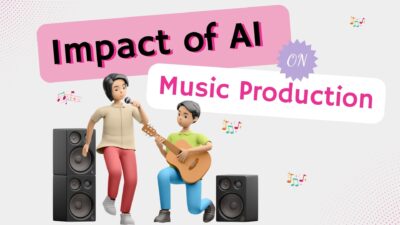
In recent years, technology has advanced at an unprecedented pace, transforming various aspects of our lives, including the way we work and create. From the introduction of vinyl records to the rise of online music streaming, technology has played a crucial role in shaping the music industry. Today, with the emergence of artificial intelligence (AI), the music landscape is witnessing significant changes. This blog explores how AI is influencing music production and the creative process.
The Role of AI in Music Production
Creative Assistants
One of the most exciting developments in the music industry is the emergence of AI as a creative assistant. These AI tools can aid musicians and producers in various ways:
Melody and Harmony Creation: AI can generate melodies and harmonies, helping artists complete songs more efficiently. By analyzing vast amounts of musical data, AI can suggest chord progressions and melodies that resonate with listeners.
Exploring New Genres: AI assists creators in discovering new musical genres and styles. By analyzing trends and patterns, it enables artists to experiment with different sounds, saving time in the creative process. This exploration can lead to innovative music that pushes the boundaries of traditional genres.
Automation in Mixing
The mixing process has traditionally required a skilled engineer to balance levels, EQ, and effects. However, AI is changing that landscape:
Smart Mixing Software: Tools like LANDR utilize algorithms to analyze tracks and automatically adjust them for optimal sound quality. This automation allows artists to achieve professional-sounding mixes without extensive technical knowledge.
Time Efficiency: By automating repetitive tasks, AI frees up time for musicians and producers to focus on the creative aspects of their work. This efficiency can lead to faster project turnaround times and increased productivity.
Enhancing Production Processes
AI is also revolutionizing the overall production process:
Accessibility: In the past, producing high-quality music often required expensive equipment and professional studios. With AI, aspiring musicians can create professional-sounding tracks using just a laptop and software. This democratization of music production allows more people to express their creativity.
Support for Technical Skills: While technical expertise remains valuable, AI can bridge the gap for those who may lack experience. It provides suggestions and feedback, enabling users to improve their skills and produce better music over time.
The Human Element: Enhancement or Replacement?
As we explore the benefits of AI in music production, a crucial question arises: Is AI enhancing human creativity, or is it replacing it?
The Importance of Human Input: It’s essential to emphasize that the human element remains the most critical factor in any creative process. While AI can assist in generating ideas and optimizing workflows, it cannot replicate the unique emotions and experiences that artists bring to their work.
AI as a Tool: AI should be viewed as a tool that supports creativity rather than a replacement for human musicians. It helps reduce the time spent on technical tasks, allowing artists to focus on developing their ideas and expressing their artistic vision.
Conclusion
The integration of AI into the music industry marks a significant shift in how music is created and produced. From serving as a creative assistant to automating mixing processes and enhancing production capabilities, AI is undeniably changing the landscape of music. However, it is crucial to remember that the essence of music lies in human creativity and emotion.
As we embrace these technological advancements, we must recognize that AI is here to support and amplify our creative endeavors, not to replace the unique contributions of human artists. The future of music will undoubtedly be a harmonious blend of technology and human artistry, paving the way for exciting innovations in the years to come.
In conclusion, as we navigate this new era of music production, let us celebrate the potential of AI while cherishing the irreplaceable role of human creativity. The collaboration between technology and artistry promises to lead to a vibrant and diverse musical landscape, enriching our lives and inspiring future generations of musicians.


